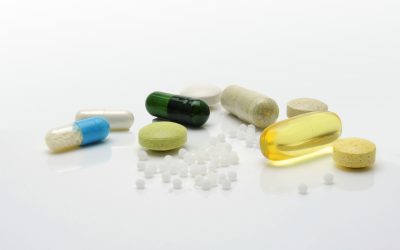Acne: A Sign of Hormonal Turmoil
Do you ever wonder why those annoying little pimples pop up uninvited from time to time? Many adults still experience acne well past their teenage years and into their adult lives. It can be annoying, frustrating, and embarrassing at times. The location, timing, and severity of acne can say a lot about what’s going on inside the body. Our skin, after all, is the biggest and the most visible organ of them all.
Hormone regulation is tricky business, that’s why it typically takes a few years for our body to figure things out. But when acne continues into the adult years, especially past the age of 25, it’s a good idea to listen to what your body is trying to tell you.
Different Types of Acne
Non-inflammatory Acne
Whiteheads are your typical squeeze and pop pimples. They usually have a white tip with a thin layer of skin over it.
Blackheads tend to find homes on the nose, chin, or other oily areas. The pores are usually open and filled with oil and dead skin.
Inflammatory Acne
Cystic acne tends to be deep, large, and painful to the touch. It usually occurs in people with oily skin or those with hormonal conditions (like PCOS). Cystic acne is filled with oil trapped dirt, bacteria, and dead skin cells.
What Is My Acne Really Trying To Tell Me?
Hormone Imbalance – One of the most common causes of acne.
Under our skin, there are tiny oil glands that protect our skin and keep it lubricated. But when there’s a hormone imbalance, the oil glands get over-stimulated and work overtime. This accumulation of oil, dirt, dead skin cells and bacteria usually manifest as acne. The location of acne varies from person to person, but the most common areas affected are where we have more active oil glands, like the forehead, nose, and chin.
Inflammatory acne is when bacteria is involved in overstimulated oil glands, resulting in the immune system attacking the perceived threat. This often shows up on the skin as red, raised bumps that are tender to touch (such as cystic acne).
Factors that may lead to hormone imbalance include:
- Conditions associated with hormone imbalance (e.g. PCOS)
- Stress
- Certain medications may also lead to hormone imbalance, causing acne
- Personal health products containing hormone disruptors (e.g. cosmetics, face wash, lotion)
- A diet heavy in carbohydrates and dairy
A Story About Dairy, A Sweet, Sweet Tale
Dairy and sugar (and other carbohydrates) stimulate IGF-1 (insulin-like growth factor-1), insulin, endogenous reproductive and growth hormones. All of these contribute to the development of acne. IGF-1 is a big player in this mix. It has the power to directly increase cell count, oil, and androgen production. As we discussed previously, an increase in androgen also means an increase in oil production, clogging pores and trapping bacteria.
It is not news that sugar and other carbohydrates cause a spike in insulin, which sets off a butterfly effect in the body, leading to an increase in androgens. This chain of events is no exception to dairy. The moment dairy enters the body, it initiates a signal that results in an insulin spike and eventually an increase in androgens.
In women with PCOS, testosterone level tends to be elevated and insulin sensitivity tends to be low. This means the increase in androgens (testosterone) and insulin after carbohydrate and dairy consumption makes PCOS worse.
What Traditional Chinese Medicine Says About Acne
Traditional Chinese Medicine (TCM) sees the face as a reflection of the different organ systems inside our body. Face mapping refers to the different regions of our face as a direct representation of the functioning of the internal organs. For example, acne on the forehead may be a sign of dehydration (the bladder region in the illustration below) or digestive issues in the small intestine. 
Forehead
The forehead is a reflection of the functioning of the digestive system. The forehead contains the urinary bladder and the small intestine channels. Acne in these areas tends to be a manifestation of malfunctioning or stagnation of the digestive system. If you haven’t been treating your body well by eating too much sugar, processed, or unhealthy foods, acne may be a reminder of that fun weekend. Stress also plays a huge part in digestive health, which means if you have been stressed, expect some acne to appear on the forehead.
Cheeks
The cheeks are a reflection of external toxins, contact with hair or other objects. Cheeks get touched a lot. From personal care products like makeup to phones, hair and other objects coming in contact with them, our cheeks get a lot of attention. Those can be contributing to acne, but it could also be an indication of respiratory or digestive system conditions.
Between The Eyebrows
A reflection of liver health and function. Our liver is such an important organ. When there is a build up of toxins (e.g. pollution, medicine, alcohol, sugary or greasy foods), our liver has a hard time processing efficiently and results in a build-up of toxins. This build-up is reflected in different conditions as well as through the skin, like acne.
Jawline
The jawline is a reflection of hormone imbalance. They may be more active around the menstrual cycle due to hormonal shifts and are more active in people with hormonal conditions (like PCOS). These tend to be deep and large cystic pimples. Sometimes they may even be blind pimples that are hidden and appear inflamed on the surface. These tend to take a while to heal and may not go away on their own.
How Can A Naturopathic Doctor Help?
Liver Health
Our skin is a reflection of the health of our organs, and liver is definitely a big player in the skin. From both Western and Eastern medical perspectives, liver health is essential to our overall health. It’s a place where our binge drinking and junk food-eating habits get filtered. But if there’s too much toxin build-up in the liver, processing can get sluggish and the body will find other ways to push out the toxins, one of them is through the skin. It is important to periodically eliminate toxins and help the body run smoothly. Our diet and lifestyle also play a critical role in this.
Diet Modification
It sounds cliché, but we really are what we eat. A study1 comparing a low glycemic diet (a diet that has less effect on insulin level) to a control group, over a period of 10 weeks, found improvements in both inflammatory and non-inflammatory acne. Foods like dairy and carbohydrates tend to throw off our hormone balance and cause issues. Load up your meals with leafy greens, colourful vegetables, and fresh fruits will keep your gut happy and your skin glowing. A healthy diet will improve skin quality over time and is very important in the prevention of future acne. To learn more about eating to support hormone balance, check out our post here.
Hormone Balancing Herbs
Dong Quai: Great for regulating female reproductive conditions
Vitex: Used for female hormone-related conditions and acne due to hormonal imbalance
Dandelion root: Great for liver health and acne
Burdock: Great for liver detox, acne and other skin issues
Calendula: Both internal and external use help with acne and other skin conditions
A Final Word
Our body is an intricate system, in which everything’s interconnected and works together to create harmony. Acne and other skin conditions usually signal the body sends out in trying to let us know something’s not right inside. Pay attention to the location and timing of acne, they can say a lot about your health and lifestyle choices. If you are suffering from acne, consider taking out dairy and carbohydrates by replacing them with healthier options, eat more liver cleansing foods, and incorporate some hormone balancing herbs. There are many options available in regulating hormones, reducing acne and other related conditions. No one prescription fits all, so consult a healthcare practitioner for an individualized assessment and treatment plan. If you are struggling with hormonal acne, at Awaken Life Dr. Priya Prakash is here and happy to help!
With love and in health,
Priya
References
- Kwon, H., Yoon, J., Hong, J., Jung, J., Park, M. and Suh, D. (2012). Clinical and Histological Effect of a Low Glycaemic Load Diet in Treatment of Acne Vulgaris in Korean Patients: A Randomized, Controlled Trial. Acta Dermato Venereologica, 92(3), pp.241-246.
I want to help you get there. The key to your fertility lies within you.
Let's Awaken it!
More Reading
Naturopathic Medicine in Fertility
Whether you are just starting to try to get pregnant, struggling with getting pregnant or suffering from recurrent miscarriages, a fertility naturopathic doctor can help you along your fertility journey. Naturopathic doctors are trained healthcare professionals with...
The Role of Melatonin in Fertility
Most of us have heard about melatonin in the context of sleep, as a supplement that can impact our circadian rhythm. However, this hormone also plays an important role in female fertility. What is Melatonin? Melatonin is a hormone made by the pineal gland in...
Simple Tips to Improve Your Chances of Conceiving
It’s easy to get caught up in the minor details of what we could be doing better when trying to get pregnant. This can lead to constant thoughts around the effects that our daily activities have on our chances. This self-criticism can feel overwhelming and...




Share This
Share this post with your friends!